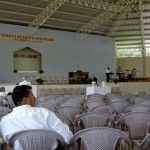Send out your… wait, did you say “dead” or “best”?
Felicity at “Simply Church” is at it again in her post “They dirty secret of missions.”
Most of the post is a quote from Rick Wood, editor of Missions Frontier magazine. In the quote, Wood laments that many of the “missionaries” who are sent out by churches and organizations have very little (or no) experience actually discipling other people.
But, then, Felicity asks two pointed questions and makes an astute observation:
Will we in the simple/organic church do any better? The church in Antioch sent out their best when they sent out Paul and Barnabus. Are we training up people who can make disciples and start churches in our own context before we send them out onto the mission field?
We’ll never know whether or not Paul and Barnabas were “the best” in Antioch. However, we do know this: Paul and Barnabas were already serving others in Jesus name when God and the church in Antioch sent them out. (See Acts 13:1.)
I especially like Felicity’s second question. We begin by recognizing that God is sending all of his children out – whether across the street or across the globe.
Old friends go; new friends come: the life of a pilgrim on the Way
Yesterday, I noticed with much interest that Josh at “Called to Rebuild” had written a new blog post called “Reflecting on three years in organic church life.” I’ve been following Josh’s blog for a while (probably not for 3 years), and I always enjoy his post. So, I was looking forward to reading this “reflection” post.
Now, to begin with, I have to admit that Josh’s post is not what I expected – it’s even better. He does not go into the details of his “organic church life” nor does he talk about how much better it is than traditional/institutional church life.
Instead, Josh talks about some of the current struggles that he’s having. What are those struggles? Well, the brothers and sisters that he and his family have been gathering with are no longer going to assemble together.
Here is that part of the post:
Alas, however, in our case the old adage came to pass that “all good things must come to an end.” One couple moved, then another, and others who were meeting with us decided to pursue other courses, and now there is nothing in the way of a visible gathering left to show. Cue the sad music. Not really.
(Make sure to jump over to Josh’s post and read the rest. It is all very good, and includes some details about how all these people came together in the first place.)
When I read this post – and especially the paragraph above – I was reminded of something. According to Scripture, the very first Christians referred to themselves as “The Way.” They knew that they were on a path, a journey, living a way of life. And, they knew that was the life of a pilgrim – to go wherever God sent them.
Now, this does not always make it easy for us – such as in Josh’s case. But, we can trust God that as some brothers and sisters and opportunities move out of our lives, others will move in. The brothers and sisters and opportunities will be different… but they will be exactly what we need.
As difficult as it is to do sometime, when people move out of our lives – for whatever reason – we should look back to the many things that God taught us through our relationship with them and look forward to the new things that God is going to do through new relationships.
Has anyone else experienced this or is anyone else experiencing this now?
Fighting the War on Christmas… in Jesus’ Name, of course
Skye at “Out of Ur” has written a very insightful article called “The Wrong War on Christmas.”
The article traces how Christians responded to Christmas only a hundred years ago (or so), and compares that to how Christians respond to Christmas today. (Of course, I’ve always said that Christians – Evangelicals in particular – have a short memory.) In the late 1800’s and early 1900’s, many Christians did not accept Christmas as a “religious” holiday.
When did this change? When the American culture (society) began to accept Christmas more widely, then Christians and the church began to accept and celebrate it as well.
Today, many Christians fight to “keep the Christ in Christmas.” (I wonder how many are also keeping the “Mass” in Christmas…)
Anyway, the last part of Skye’s article should cause all of us to think… whether we celebrate Christmas or not:
Sadly, the “War on Christmas” and “Christmas Under Siege” campaigns pushed by some conservative Christians says more about the church’s captivity to consumerism than its commitment to the love of Christ and their neighbors.
Just something to think about…
Report on Simple/Organic/House/Missional Church in the UK and Ireland (2011)
Ben from “MissionBritain” wrote a guest post for me a few months ago called “Building a culture of discipleship.” (If you haven’t read his guest post, please do. It is excellent!)
Last week, he sent me a copy of a report on simple/organic/house/missional churches in the UK and Ireland. You can read more information and download the complete report here: “Simple/Organic/House/Misisonal Church in the UK and Ireland (2011).”
While I would encourage you to read the entire report, I want to highlight a few of the statistics. (By the way, the report is NOT a list of statistics. Instead, it includes much more information, including some suggested steps forward.)
We asked people to describe their simple/organic/house/missional church and the top answer was – “We are a group of Christians seeking to live out New Testament principles/models of church.”
We asked people to describe their journey so far in terms of seeing people baptised.
– Approximately 60% of people said that they had seen some people baptised and discipled.
– No-one said that they had seen many people baptised and discipled.
– 40% of people involved with simple/organic/house/missional church in the UK and Ireland said that “It has been a challenge to keep persevering on this path when it seems that we have seen little fruit from our efforts.”
Do you see the disconnect? While most of the people in the report said they were trying to “live out New Testament principles,” very few were actually baptizing or making disciples. In fact, a large number (40%) said they had seen “little fruit.”
Now, I’m sure these 40% have seen many changes when it comes to church practices, methods of gathering together, and leadership. But, they have seen “little fruit” specifically in terms of baptism and discipleship.
Should we expect “fruit” if we are living according to New Testament principles? If so, is there something missing? What?
But I thought we were in Nicaragua
A few years ago – before I really started studying the church from the perspective of the New Testament – my family went to Nicaragua with some friends on a mission trip. When we got to Nicaragua, almost everything was new and different because we were in a new and different culture.
But, when we “went to church,” it was like we were back in the southern part of the United States of America – except the language, of course. Even then, I noticed the stark difference between the culture and the church.
I thought about this when I read a post by Felicity at “Simply Church” called “Missions: the bad!”
She writes:
In many nations we have been to, the church resembles any traditional church in the West. The buildings look the same, the people dress in Western clothes for services; they sing translations of Western hymns or songs. Pictures of Jesus portray him as Anglo. The people love God with all their hearts, but Christianity is known as a foreign religion by those outside the church because it looks so different–so Western.
The history of missions shows much insensitivity to local culture. Missionaries, with the best of intentions, confused Christianity and Western culture. They are not one and the same.
The Good News of Jesus transcends culture; it can be contextualized within any culture.
In many places, the damage is done. With great intentions, the gospel was planted along with a Western church culture (the good, the bad, and the ugly of that Western church culture).
But, today, wherever we are, how do we ensure that when we proclaim the gospel we are not also proclaiming our own church culture, whether that is a more institutional church culture or a more organic church culture? (And, you do have a church culture…)
Do disciples understand everything that Jesus said?
Scott at “Following His Path” has pointed out aa interesting passage in his short post “Don’t Miss What Jesus Said.”
He quotes from Luke 18:34 in which the author explains that the Twelve did not understand what Jesus had told them because “[it] was hidden from them.”
Concerning that verse, Scott says,
Do we have such a pre-conceived idea of Jesus that we miss what He says?
– understood none of these things.
– The meaning of this statement was hidden from them.
– they did not comprehend what was said.Let us not be arrogant and think we can know everything. Some things God will not reveal to us. Rev 10:14
But at the same time, let us look to God for His light. And keep our heart Prov. 4:23 soft and not hard. Hardness of heart will blind us from the truth. Eph 4:18
Now, I understand that this account happened before the Twelve (and others) were indwelled by the Holy Spirit. But, I wonder… do disciples today understand everything that Jesus said? Is it possible that some things are hidden from us today? Could something be hidden from some but revealed to others?
I think it’s possible… and I think Scott’s exhortation is valid: “Let us not be arrogant and think we can know everything.”
What do you think?
Don’t assume he’s that kind of Christian
Last week, I wrote a post called “What kind of Christian are you?” The point of the post is that I don’t really fit into any “mold” of Christian tradition. Of course, very few people fit into any kind of mold. Hopefully, we can treat each other as individuals – created differently by God.
Jon at “Jon’s Journey” as picked up on that theme and written an article called “I’m not that kind of Christian.” However, I think that Jon did a much better job of expressing what I was trying to get across.
He points out several Christians traditions or movements that have shaped and molded him, but also admits that he doesn’t really fit into any of those molds.
I like his last paragraph the best:
If you claim Christ as Lord, and our paths cross… Our task is not to judge, build walls, and divide. Our task is to build each other up to become more like Christ.
It seems that several people were encouraged by my post, so I wanted to point you to Jon’s as well. To me, it is even more encouraging!
We keep singing… as the hungry roam the streets
Joel at “The Double Edged Sword” wrote a post called “Leave the Walls Behind.” Like I told him in a comment, I still have decided if I’m glad that he wrote this post at all.
Most of the post (all except for two short sentences at the top) is the lyrics to a song by Leeland called “While We Sing.” (I don’t keep up with the music industry that much, so I don’t know if Leeland or the song “While We Sin” is or was popular.
Regardless of the popularity, I thought the lyrics were worth contemplating.
Here’s a video of the song (with lyrics):
By the way, before you point out that God desires for us to praise him – even with our singing – I want to remind you of this passage from Isaiah:
Hear the word of the Lord, you rulers of Sodom! Give ear to the teaching of our God, you people of Gomorrah! “What to me is the multitude of your sacrifices? says the Lord; I have had enough of burnt offerings of rams and the fat of well-fed beasts; I do not delight in the blood of bulls, or of lambs, or of goats. When you come to appear before me, who has required of you this trampling of my courts? Bring no more vain offerings; incense is an abomination to me. New moon and Sabbath and the calling of convocations – I cannot endure iniquity and solemn assembly. Your new moons and your appointed feasts my soul hates; they have become a burden to me; I am weary of bearing them. When you spread out your hands, I will hide my eyes from you; even though you make many prayers, I will not listen; your hands are full of blood. Wash yourselves; make yourselves clean; remove the evil of your deeds from before my eyes; cease to do evil, learn to do good; seek justice, correct oppression; bring justice to the fatherless, plead the widow’s cause. (Isaiah 1:10-17 ESV)
It’s clear that God desired for the children of Israel to bring sacrifices to him, but he didn’t want them in this passage. It’s clear that God wanted his children to pray to him – but not in this passage. God had told people how to honor the Sabbath and to hold special feasts, but in this passage he said he had grown weary of them.
What was missing? Why had God grown tired of these displays of affection and worship that he hod told people to bring to him? Perhaps the reason similar to the lyrics of the Leeland song “While We Sing” above…
What if God is tired of hearing all of our songs of praise for the same reason?
Visualize every word in the Bible?
So, I saw this post/video on CNN iReport this morning called “Doug and the Bible Project.”
It sounds really good, but, to be honest, I just don’t get it. I’m not writing this to put down this project, but to honestly ask for help.
The short description sounds really good:
Doug recorded this video of himself assembling an art project that visualizes every word in the Bible.
“I really just wanted to see what it would look like to see the entire Bible all at once,” he said.
“Every page. Every word. Not just your favorite passage and ignoring what you don’t like. The whole thing. What would it look like?”
And, the video itself begins with these words:
Warning
This is not religious.
This is not political.
I just want to start a conversation.
What would it look like to see the entire Bible all at once?
You can jump over to the CNN page (link above) to watch the video, or watch it here:
I’m not going to comment on the video yet. But, I’m not certain what this guy is trying to do.
What do you think?
Can we begin by assuming unity in Christ?
Last week, Arthur at “The Voice of One Crying Out in Suburbia” wrote an excellent post called “The Assumption of Disunity.”
He begins his post by giving a quick synopsis of a book called Four Views on the Spectrum of Evangelicalism. If you’re interested in the book, you can jump over to Arthur’s blog and read what he says.
The point that I want to bring out comes at the end of the synopsis. Arthur says that the four contributors to that book assume disunity, not only among the church as a whole, but even among the sub-group called “Evangelicals.” Arthur explains, “All of these conversations invariably work within a framework where the church has just decided to shrug our collective shoulders, throw up our collective hands and just accept disunity and assume it is normal and unavoidable.”
How does Arthur respond to this?
I reject this. I don’t reject it because I think it is not the reality on the ground and has been for centuries. I reject assumed disunity because it is something that the Gospel simply demands that we reject and overcome. There is simply no way to read the New Testament and come away with practices that lead to a disunified church made of up thousands of competing local churches. The New Testament spends a ton of time breaking down the walls between believers and we have promptly spent the last two thousand years building them right back up in new, innovative ways.
Think about this for a moment… What would happen if we assumed unity in Christ instead of assuming disunity based on our traditions and backgrounds and interpretations? Is that even possible? I think it is…
In fact, I want to expressly state something that I hope has been apparent through my blog posts: If I disagree with you, or if you disagree with me, I do not automatically assume that we are divided from one another because of that (those) disagreement(s). Instead, my first assumption is that we are united in Christ – brothers and sisters – whose bond is stronger than flesh and blood and able to withstand our disagreement.
Idealistic? Maybe. But, like Arthur, I believe that the gospel demands our unity in Christ, and I will seek to live in it.










